Chaung-U June 19
In Chaung-U Township, part of Monywa District in the Sagaing Region, more than 2,000 acres of pigeon pea have already been cultivated during this year's monsoon crop season, according to data from the ChaungU Township Agriculture Department.
For the 2025-2026 monsoon season, Chaung-U Township had planned to cultivate 20,300 acres of pigeon pea. Planting began in May this year, and as of today, 2,673 acres have been successfully cultivated.
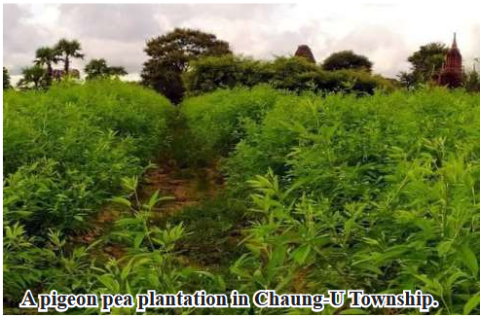
Chaung-U June 19
In Chaung-U Township, part of Monywa District in the Sagaing Region, more than 2,000 acres of pigeon pea have already been cultivated during this year's monsoon crop season, according to data from the ChaungU Township Agriculture Department.
For the 2025-2026 monsoon season, Chaung-U Township had planned to cultivate 20,300 acres of pigeon pea. Planting began in May this year, and as of today, 2,673 acres have been successfully cultivated.
"This monsoon season, Chaung-U Township aimed to grow pigeon pea on over 20,000 acres. To date, more than 2,000 acres have already been planted," said U Tint Swe, the head of the ChaungU Township Agriculture Department. "We are working to ensure the cultivation meets the targeted acreage while also focusing on improving yield. Farmers grow pigeon pea both as a standalone crop and as an intercrop."
This year, the township agriculture department has been providing on-field training to pigeon pea farmers on selecting high-quality seeds, proper cultivation techniques, pest control, and yield improvement.
Additionally, to reduce costs for farmers, the department is promoting a fertilizer blending technique using urea and potash. This method not only lowers cultivation expenses but also helps keep crops pestfree and enhances plant growth.
Source: Yadanar Bon Newspaper
Chaung-U June 19
In Chaung-U Township, part of Monywa District in the Sagaing Region, more than 2,000 acres of pigeon pea have already been cultivated during this year's monsoon crop season, according to data from the ChaungU Township Agriculture Department.
For the 2025-2026 monsoon season, Chaung-U Township had planned to cultivate 20,300 acres of pigeon pea. Planting began in May this year, and as of today, 2,673 acres have been successfully cultivated.
"This monsoon season, Chaung-U Township aimed to grow pigeon pea on over 20,000 acres. To date, more than 2,000 acres have already been planted," said U Tint Swe, the head of the ChaungU Township Agriculture Department. "We are working to ensure the cultivation meets the targeted acreage while also focusing on improving yield. Farmers grow pigeon pea both as a standalone crop and as an intercrop."
This year, the township agriculture department has been providing on-field training to pigeon pea farmers on selecting high-quality seeds, proper cultivation techniques, pest control, and yield improvement.
Additionally, to reduce costs for farmers, the department is promoting a fertilizer blending technique using urea and potash. This method not only lowers cultivation expenses but also helps keep crops pestfree and enhances plant growth.
Source: Yadanar Bon Newspaper
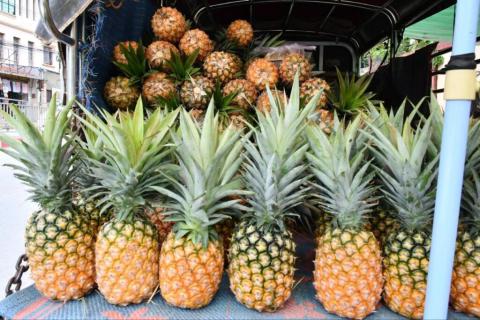
The purchase of pineapples has increased during their season, according to sellers and consumers. Due to the plenty of supply, the price is cheap, and pineapple is a favourable fruit for consumers, said a seller.
“Pineapple is abundantly available in the monsoon, and both old people and young people enjoy it. People eat it as a snack and also cook it. It is the season when the supply is abundant and the price is also cheap,” said a seller.
Some buy them to resell as juice.
The purchase of pineapples has increased during their season, according to sellers and consumers. Due to the plenty of supply, the price is cheap, and pineapple is a favourable fruit for consumers, said a seller.
“Pineapple is abundantly available in the monsoon, and both old people and young people enjoy it. People eat it as a snack and also cook it. It is the season when the supply is abundant and the price is also cheap,” said a seller.
Some buy them to resell as juice.
“Pineapple is rich in Vitamin C and other health benefits. So, we eat it often,” said a woman. — MT/ZS
Source: The Global New Light of Myanmar
The purchase of pineapples has increased during their season, according to sellers and consumers. Due to the plenty of supply, the price is cheap, and pineapple is a favourable fruit for consumers, said a seller.
“Pineapple is abundantly available in the monsoon, and both old people and young people enjoy it. People eat it as a snack and also cook it. It is the season when the supply is abundant and the price is also cheap,” said a seller.
Some buy them to resell as juice.
“Pineapple is rich in Vitamin C and other health benefits. So, we eat it often,” said a woman. — MT/ZS
Source: The Global New Light of Myanmar
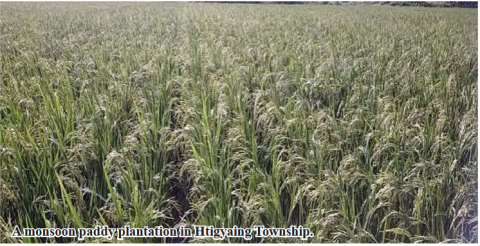
Htigyaing June 19
More than 40,000 acres of rain-fed rice will be planted in Htigyaing Township, Katha District, Sagaing Region during this year rain crops planting season, according to the Department of Agriculture for Htigyaing Township.
During the 2025-2026 rain crops planting season, Htigyaing Township is planning to plant 40,278 acres of rain-fed rice, and the rainfed rice cultivation will begin from July to September this year.
Htigyaing June 19
More than 40,000 acres of rain-fed rice will be planted in Htigyaing Township, Katha District, Sagaing Region during this year rain crops planting season, according to the Department of Agriculture for Htigyaing Township.
During the 2025-2026 rain crops planting season, Htigyaing Township is planning to plant 40,278 acres of rain-fed rice, and the rainfed rice cultivation will begin from July to September this year.
“This year, Htigyaing Township is planning to plant more than 40,000 acres of rain-fed rice. We will work to ensure that the targeted acres are planted. We will provide the necessary technology and varieties for rain-fed rice cultivation. We will conduct field visits to help farmers to plant rainfed rice on time,” said U Ko Ko Aung, head of the Department of Agriculture for Htigyaing Township.
This year, the relevant Township Department of Agriculture and local farmers will work together to ensure that rain-fed rice cultivation is carried out without any difficulties during the rain crops planting season.
Source: Yadanar Bon Newspaper
Htigyaing June 19
More than 40,000 acres of rain-fed rice will be planted in Htigyaing Township, Katha District, Sagaing Region during this year rain crops planting season, according to the Department of Agriculture for Htigyaing Township.
During the 2025-2026 rain crops planting season, Htigyaing Township is planning to plant 40,278 acres of rain-fed rice, and the rainfed rice cultivation will begin from July to September this year.
“This year, Htigyaing Township is planning to plant more than 40,000 acres of rain-fed rice. We will work to ensure that the targeted acres are planted. We will provide the necessary technology and varieties for rain-fed rice cultivation. We will conduct field visits to help farmers to plant rainfed rice on time,” said U Ko Ko Aung, head of the Department of Agriculture for Htigyaing Township.
This year, the relevant Township Department of Agriculture and local farmers will work together to ensure that rain-fed rice cultivation is carried out without any difficulties during the rain crops planting season.
Source: Yadanar Bon Newspaper
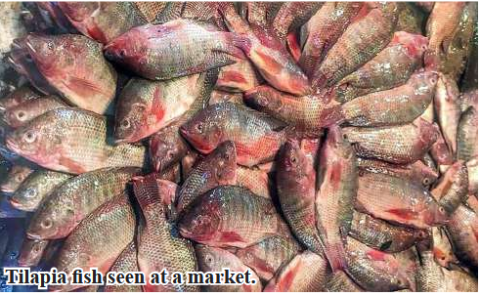
Nyaungdon June 17
Local merchants from Nyaungdon Township of Ayeyawady Region sold 70,000 viss of tilapia to Yangon market in May 2025, said Daw
Khin Khin Htay, the owner of marine product trading in Nyaungdon Township.
In April of this year, up to 50,000 viss of tilapia fish from Nyaungdon Township were successfully delivered and sold to the Yangon market. In May, up to 70,000 viss were delivered and sold.
Nyaungdon June 17
Local merchants from Nyaungdon Township of Ayeyawady Region sold 70,000 viss of tilapia to Yangon market in May 2025, said Daw
Khin Khin Htay, the owner of marine product trading in Nyaungdon Township.
In April of this year, up to 50,000 viss of tilapia fish from Nyaungdon Township were successfully delivered and sold to the Yangon market. In May, up to 70,000 viss were delivered and sold.
It is reported that in this region, fishery trade businesses purchase locally sourced fishery products, clean them systematically, and continue to export and sell them to the Yangon market.
"From our side, we mainly supply fishery products to the Yangon market. Since there is strong demand for tilapia fish in the local Yangon market, we were able to sell large volumes in viss weight. With such high volumes being delivered and sold, both producers and traders are doing well. Due to the increasing demand for fish, fish farmers are also increasing their stock," said Daw Khin Khin Htay.
Tilapia fish from Nyaungdon Township include both farm-raised and naturally caught varieties. The farming period for tilapia fish is about two and a half to three months. It is reported that tilapia fish delivered from Wakema Township to the Yangon market are currently being sold at prices as high as 14,500 kyats per viss.
Kyaw Kyaw Lin
Source: Yadanar Bon Newspaper
Nyaungdon June 17
Local merchants from Nyaungdon Township of Ayeyawady Region sold 70,000 viss of tilapia to Yangon market in May 2025, said Daw
Khin Khin Htay, the owner of marine product trading in Nyaungdon Township.
In April of this year, up to 50,000 viss of tilapia fish from Nyaungdon Township were successfully delivered and sold to the Yangon market. In May, up to 70,000 viss were delivered and sold.
It is reported that in this region, fishery trade businesses purchase locally sourced fishery products, clean them systematically, and continue to export and sell them to the Yangon market.
"From our side, we mainly supply fishery products to the Yangon market. Since there is strong demand for tilapia fish in the local Yangon market, we were able to sell large volumes in viss weight. With such high volumes being delivered and sold, both producers and traders are doing well. Due to the increasing demand for fish, fish farmers are also increasing their stock," said Daw Khin Khin Htay.
Tilapia fish from Nyaungdon Township include both farm-raised and naturally caught varieties. The farming period for tilapia fish is about two and a half to three months. It is reported that tilapia fish delivered from Wakema Township to the Yangon market are currently being sold at prices as high as 14,500 kyats per viss.
Kyaw Kyaw Lin
Source: Yadanar Bon Newspaper
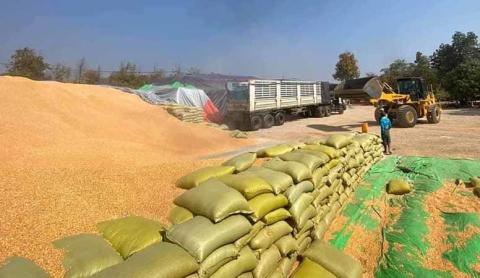
The maize price in the domestic market went up following strong global market sentiments and stock shortage in the domestic market.
Myanmar’s maize is primarily sent to Thailand at present with free customs duty. They are also sent to China, India, the Philippines and Bangladesh.
The maize price in the domestic market went up following strong global market sentiments and stock shortage in the domestic market.
Myanmar’s maize is primarily sent to Thailand at present with free customs duty. They are also sent to China, India, the Philippines and Bangladesh.
Thailand gives the green light for maize imports under zero tariff (with Form D), between 1 February and 31 August. However, Thailand imposes a maximum tax rate of 73 per cent on maize imports to protect the rights of their growers if the maize is imported during the maize season of Thailand.
Additionally, China has been purchasing Myanmar’s maize through cross-border trade under the alternative development programme. Legitimate maize trade between Myanmar and China commenced at the end of 2022. A total of 112 Myanmar companies have been permitted for maize exports.
The maize is cultivated in Shan, Kachin, Kayah and Kayin states and Mandalay, Sagaing and Magway regions. Myanmar has three maize seasons: winter, summer and monsoon. Myanmar’s annual maize output is estimated at 2.5-3 million tonnes. — NN/KK
Source: The Global New Light of Myanmar
The maize price in the domestic market went up following strong global market sentiments and stock shortage in the domestic market.
Myanmar’s maize is primarily sent to Thailand at present with free customs duty. They are also sent to China, India, the Philippines and Bangladesh.
Thailand gives the green light for maize imports under zero tariff (with Form D), between 1 February and 31 August. However, Thailand imposes a maximum tax rate of 73 per cent on maize imports to protect the rights of their growers if the maize is imported during the maize season of Thailand.
Additionally, China has been purchasing Myanmar’s maize through cross-border trade under the alternative development programme. Legitimate maize trade between Myanmar and China commenced at the end of 2022. A total of 112 Myanmar companies have been permitted for maize exports.
The maize is cultivated in Shan, Kachin, Kayah and Kayin states and Mandalay, Sagaing and Magway regions. Myanmar has three maize seasons: winter, summer and monsoon. Myanmar’s annual maize output is estimated at 2.5-3 million tonnes. — NN/KK
Source: The Global New Light of Myanmar
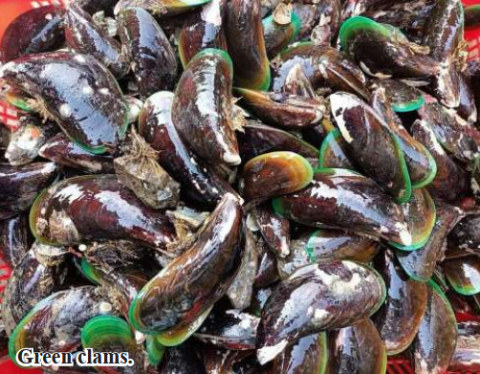
Mawlamyinegyun June 16
Local merchants from Mawlamyinegyun Township of Ayeyawady Region sold a large number of green clams to Yangon market in May, said Daw Moe Myint, the owner of fishery product trading in Mawlamyinegyun Township.
They supply green clams to Yangon market. In April, they sent 50,000 green clams to Yangon market, in comparison with 70,000 viss in May due to high demand from Yangon.
Mawlamyinegyun June 16
Local merchants from Mawlamyinegyun Township of Ayeyawady Region sold a large number of green clams to Yangon market in May, said Daw Moe Myint, the owner of fishery product trading in Mawlamyinegyun Township.
They supply green clams to Yangon market. In April, they sent 50,000 green clams to Yangon market, in comparison with 70,000 viss in May due to high demand from Yangon.
She disclosed: “Green clams are in high demand at Yangon market. Merchants sent larger volume of green clams to Yangon in previous months. Local fishermen catch fish, prawn and crabs naturally. They send fishery products including green clams to Yangon market via Mawlamyinegyun Township.
High demand reflects creation of more and more job opportunities for fishermen and those in production chain. At present green clam fetches K15,500 per viss.”
Merchants and businesspersons purchase marine products from fishermen in Mawlamyinegyun Township to sell it with systematic processing and packaging process to Yangon market which distributes fishery products to other regions and states.
Source: The Global New Light of Myanmar
Mawlamyinegyun June 16
Local merchants from Mawlamyinegyun Township of Ayeyawady Region sold a large number of green clams to Yangon market in May, said Daw Moe Myint, the owner of fishery product trading in Mawlamyinegyun Township.
They supply green clams to Yangon market. In April, they sent 50,000 green clams to Yangon market, in comparison with 70,000 viss in May due to high demand from Yangon.
She disclosed: “Green clams are in high demand at Yangon market. Merchants sent larger volume of green clams to Yangon in previous months. Local fishermen catch fish, prawn and crabs naturally. They send fishery products including green clams to Yangon market via Mawlamyinegyun Township.
High demand reflects creation of more and more job opportunities for fishermen and those in production chain. At present green clam fetches K15,500 per viss.”
Merchants and businesspersons purchase marine products from fishermen in Mawlamyinegyun Township to sell it with systematic processing and packaging process to Yangon market which distributes fishery products to other regions and states.
Source: The Global New Light of Myanmar

The No 3 Heavy Industries Enterprise under the Ministry of Industry invited a tender for the procurement of 573,200 visses of A-grade long-staple cotton, 600,000 visses of A-grade cotton and 100,000 visses of C-grade cotton in the current financial year 2024-2025.
A tender submission will be accepted by 16 June 2025. The No 3 Heavy Industries Enterprise informed the Myanmar Cotton and Cotton Products Merchant Association of a tender invitation situation in order to source raw materials for cotton ginning factories.
The No 3 Heavy Industries Enterprise under the Ministry of Industry invited a tender for the procurement of 573,200 visses of A-grade long-staple cotton, 600,000 visses of A-grade cotton and 100,000 visses of C-grade cotton in the current financial year 2024-2025.
A tender submission will be accepted by 16 June 2025. The No 3 Heavy Industries Enterprise informed the Myanmar Cotton and Cotton Products Merchant Association of a tender invitation situation in order to source raw materials for cotton ginning factories.
Individuals can enquire about details through the contact numbers of the production department of the No 3 Heavy Industries Enterprises located at Office 37 in Nay Pyi Taw at 067 3408138, 067 3408439, and 067 3408492. — NN/KK
The No 3 Heavy Industries Enterprise under the Ministry of Industry invited a tender for the procurement of 573,200 visses of A-grade long-staple cotton, 600,000 visses of A-grade cotton and 100,000 visses of C-grade cotton in the current financial year 2024-2025.
A tender submission will be accepted by 16 June 2025. The No 3 Heavy Industries Enterprise informed the Myanmar Cotton and Cotton Products Merchant Association of a tender invitation situation in order to source raw materials for cotton ginning factories.
Individuals can enquire about details through the contact numbers of the production department of the No 3 Heavy Industries Enterprises located at Office 37 in Nay Pyi Taw at 067 3408138, 067 3408439, and 067 3408492. — NN/KK

The Myanmar Pulses, Beans, Maize and Sesame Seeds Merchants Association aims to export two million tonnes of various pulses in the current financial year 2025-2026, beginning 1 April.
Myanmar delivered 2.14 million tonnes of various pulses to international markets in the previous financial year, earning US$1.82 billion.
Myanmar mainly exports black gram, green gram and pigeon peas to foreign markets. Of them, black gram and pigeon peas are primarily shipped to India, while green gram is exported to China and Europe.
The Myanmar Pulses, Beans, Maize and Sesame Seeds Merchants Association aims to export two million tonnes of various pulses in the current financial year 2025-2026, beginning 1 April.
Myanmar delivered 2.14 million tonnes of various pulses to international markets in the previous financial year, earning US$1.82 billion.
Myanmar mainly exports black gram, green gram and pigeon peas to foreign markets. Of them, black gram and pigeon peas are primarily shipped to India, while green gram is exported to China and Europe.
Myanmar’s pulses export revenue accounts for 38 per cent of agricultural produce export, yearly generating over $1 to 1.5 billion.
Myanmar is one of the world’s largest bean producers. Myanmar’s agriculture sector is the backbone of the country’s economy, and it contributes to over 30 per cent of the Gross Domestic Product. There are over 17 million acres of paddy and 10 million acres of pulses and beans in the country. The country’s second-largest production is pulses and beans, accounting for 33 per cent of agricultural produce and covering over 20 per cent of growing acres.
India has growing demand and consumption requirements for black grams and pigeon peas. According to a Memorandum of Understanding between Myanmar and India signed on 18 June 2021, India will import 250,000 tonnes of black grams and 100,000 tonnes of pigeon peas (tur) from Myanmar for five consecutive years from the 2021-2022 financial year to the 2025-2026 financial year. This G-to-G pact will not affect the pulses’ annual quota set by India. Myanmar’s exporters are also entitled to deliver the pulses to India under that yearly quota.
The Myanmar Pulses, Beans, Maize and Sesame Seeds Merchants Association stated that black grams, which India primarily purchases, are commonly found only in Myanmar, whereas pigeon peas, green gram and chickpeas are grown in African countries and Australia. — NN/KK
GNLM
The Myanmar Pulses, Beans, Maize and Sesame Seeds Merchants Association aims to export two million tonnes of various pulses in the current financial year 2025-2026, beginning 1 April.
Myanmar delivered 2.14 million tonnes of various pulses to international markets in the previous financial year, earning US$1.82 billion.
Myanmar mainly exports black gram, green gram and pigeon peas to foreign markets. Of them, black gram and pigeon peas are primarily shipped to India, while green gram is exported to China and Europe.
Myanmar’s pulses export revenue accounts for 38 per cent of agricultural produce export, yearly generating over $1 to 1.5 billion.
Myanmar is one of the world’s largest bean producers. Myanmar’s agriculture sector is the backbone of the country’s economy, and it contributes to over 30 per cent of the Gross Domestic Product. There are over 17 million acres of paddy and 10 million acres of pulses and beans in the country. The country’s second-largest production is pulses and beans, accounting for 33 per cent of agricultural produce and covering over 20 per cent of growing acres.
India has growing demand and consumption requirements for black grams and pigeon peas. According to a Memorandum of Understanding between Myanmar and India signed on 18 June 2021, India will import 250,000 tonnes of black grams and 100,000 tonnes of pigeon peas (tur) from Myanmar for five consecutive years from the 2021-2022 financial year to the 2025-2026 financial year. This G-to-G pact will not affect the pulses’ annual quota set by India. Myanmar’s exporters are also entitled to deliver the pulses to India under that yearly quota.
The Myanmar Pulses, Beans, Maize and Sesame Seeds Merchants Association stated that black grams, which India primarily purchases, are commonly found only in Myanmar, whereas pigeon peas, green gram and chickpeas are grown in African countries and Australia. — NN/KK
GNLM
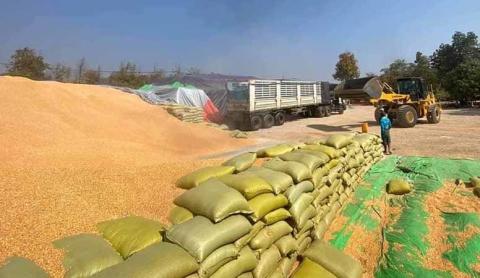
Myanmar Pulses, Beans, Maize and Sesame Seeds Merchants Association aims to achieve sesame and maize export targets of US$517 million in the 2025-2026 financial year.
The association targets to export 1.36 million bags of maize in the 2025-2026 financial year to bag $354 million. Around 90,000 tonnes of sesame are also planned to be exported this FY, with an expected income of $163 million.
Myanmar Pulses, Beans, Maize and Sesame Seeds Merchants Association aims to achieve sesame and maize export targets of US$517 million in the 2025-2026 financial year.
The association targets to export 1.36 million bags of maize in the 2025-2026 financial year to bag $354 million. Around 90,000 tonnes of sesame are also planned to be exported this FY, with an expected income of $163 million.
The association is making efforts to export value-added products such as corn silage and corn syrup. At present, the sesame export market has been sluggish. Therefore, the association is exploring new market potentials, and discussions with trade partners are ongoing.
Myanmar exported 2.4 million tonnes of maize in the previous financial year 2024-2025, generating an income of $574 million. Thailand is the top importer of Myanmar’s maize. Myanmar’s maize is flowing into Thailand under a zero-tariff benefit. Thailand gives the green light for maize imports under zero tariff (with Form-D), between 1 February and 31 August. Myanmar also exports maize to India, the Philippines and Vietnam.
Myanmar’s various sesame exports amounted to $114 million with 74,000 tonnes. Myanmar’s sesame is primarily exported to China, and also sent to Thailand, the Republic of Korea, Japan and Singapore. — ASH/KK
GNLM
Myanmar Pulses, Beans, Maize and Sesame Seeds Merchants Association aims to achieve sesame and maize export targets of US$517 million in the 2025-2026 financial year.
The association targets to export 1.36 million bags of maize in the 2025-2026 financial year to bag $354 million. Around 90,000 tonnes of sesame are also planned to be exported this FY, with an expected income of $163 million.
The association is making efforts to export value-added products such as corn silage and corn syrup. At present, the sesame export market has been sluggish. Therefore, the association is exploring new market potentials, and discussions with trade partners are ongoing.
Myanmar exported 2.4 million tonnes of maize in the previous financial year 2024-2025, generating an income of $574 million. Thailand is the top importer of Myanmar’s maize. Myanmar’s maize is flowing into Thailand under a zero-tariff benefit. Thailand gives the green light for maize imports under zero tariff (with Form-D), between 1 February and 31 August. Myanmar also exports maize to India, the Philippines and Vietnam.
Myanmar’s various sesame exports amounted to $114 million with 74,000 tonnes. Myanmar’s sesame is primarily exported to China, and also sent to Thailand, the Republic of Korea, Japan and Singapore. — ASH/KK
GNLM
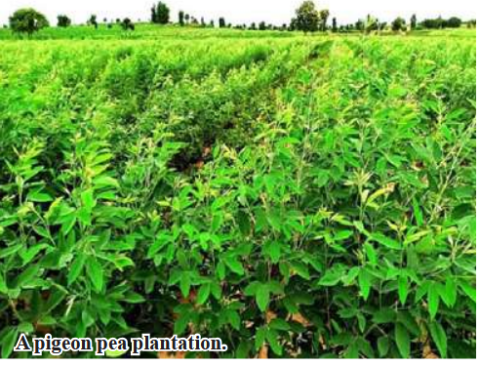
Kyunhla June 3
More than 11,000 acres of pigeon peas will be planted in Kyunhla Township, Kantbalu District, Sagaing Region in this rainy season, according to the Department of Agriculture for Kyunhla Township.
During the 2025-2026 rain crops planting season, Kyunhla Township is planned to plant 11,541 acres of pigeon peas, and the planting will begin from June to September this year.
Kyunhla June 3
More than 11,000 acres of pigeon peas will be planted in Kyunhla Township, Kantbalu District, Sagaing Region in this rainy season, according to the Department of Agriculture for Kyunhla Township.
During the 2025-2026 rain crops planting season, Kyunhla Township is planned to plant 11,541 acres of pigeon peas, and the planting will begin from June to September this year.
“This year, we planned to plant more than 11,000 acres of pigeon peas in the rainy season. We will work to meet the target acres. We will also work to improve the yield of pigeon peas.
We grow pigeon peas separately and also as a hybrid,” said Daw Myint Myint Yi, head of the Department of Agriculture for Kyunhla Township. This year, the Township Department of Agriculture will provide field education to farmers growing pigeon peas in Kyunhla Township on selecting good varieties, proper planting methods, pest prevention, and good yields.
Source: Yadanar Bon Newspaper
Kyunhla June 3
More than 11,000 acres of pigeon peas will be planted in Kyunhla Township, Kantbalu District, Sagaing Region in this rainy season, according to the Department of Agriculture for Kyunhla Township.
During the 2025-2026 rain crops planting season, Kyunhla Township is planned to plant 11,541 acres of pigeon peas, and the planting will begin from June to September this year.
“This year, we planned to plant more than 11,000 acres of pigeon peas in the rainy season. We will work to meet the target acres. We will also work to improve the yield of pigeon peas.
We grow pigeon peas separately and also as a hybrid,” said Daw Myint Myint Yi, head of the Department of Agriculture for Kyunhla Township. This year, the Township Department of Agriculture will provide field education to farmers growing pigeon peas in Kyunhla Township on selecting good varieties, proper planting methods, pest prevention, and good yields.
Source: Yadanar Bon Newspaper

